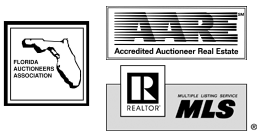Auctions vs. Selling with a Realtor
In a real estate market saturated with selling options, from traditional realtors to auctions to the private For Sale By Owner, it can be difficult to figure out which selling method is the best fit for you and your home or property. While once only associated with distressed properties, home auctions are growing rapidly in popularity. While selling through real estate auction is a great, fast, seller-controlled option, it may not be the right course of action for you. This guide to selling through auction will help you to understand how selling your property at auction compares to selling with a traditional realtor, and decide which selling strategy is best for you
Speed
Though timelines may vary, an auction is typically set up and promoted within 45 days. The post-auction settlement period is usually another 30 to 45 days, making the total timeline roughly 90 days, start to finish. This means that homes often sell faster through auction because there is a fixed date that the property is sold. All marketing happens before, and closing happens after, but this predictability is a key selling point for auctions. However, this certainty can be unnerving for some sellers because they are not in control of negotiations. That said, when potential buyers arrive at an auction, they know that they want to buy and how much they are willing to pay. The deadline of an auction motivates buyers to do their homework, get financing approved, read through contracts, and register, so by the day of the auction, they are ready to buy. The sense of urgency created by this tight timeline also encourages buyer interest.
Depending on the market, selling with a traditional realtor can take substantially longer. This process involves any improvements and staging, listing the home, multiple showings, negotiations, and the time from when the sale contract is signed to the time of the contract settlement. This time period ranges significantly depending on market activity, price, location, and other outside factors.
Cost
The costs associated with selling through auction versus selling with a realtor are competitive and depend on a number of factors. In an auction, there are auction fees and costs, and the seller pays for marketing out of pocket. However, quick property turnaround can reduce insurance, tax and maintenance costs associated with holding the property on the market. The auctioneer fee typically ranges from 1-3% of the sale price, with the focus on “impact marketing” that showcases the property to potential bidders through signage, direct mail print campaigns, online and social media advertising, and other media outlets to promote buzz and attention for the upcoming auction. When selling through auction, the seller pays the minimum amount of closing costs required by law, including the preparation of the deed, revenue stamps, and the seller’s portion of necessary taxes.
Selling through a realtor is more inclusive of various costs within the agent’s fee, including marketing and other promotional materials. Because of this, the sticker price is often higher but more predictable when selling with a realtor. The buyer also has some control of seller’s costs at closing, as they can negotiate repairs to be made or for the seller to pay all closing costs.
A house sold through auction is either offered “with reserve,” which means that the seller sets the lowest bid that they are willing to accept, or “absolute,” which means the seller accepts the highest bid without reserve. If the property is sold “with reserve,” the seller can decide not to sell the property if the highest bid does not reach their minimum bid price. In this situation, the seller still may still incur auction expenses. This reserve price is based on the property’s market value, ensuring that the seller gets the home for what it is worth. While no one – no auctioneer or real estate agent – can guarantee that a seller will get the price that they have in their head, the reserve system provides the seller with a “safety net.” An Absolute auction will attract 100% of the buyers, so consequently we typically see 15-20% higher values.
Market value is determined the same way when selling through auction or real estate agent. Is your home a fixer-upper or move in ready? Where is your home located? Are there other homes for sale nearby? However, because auctions are on a set timeline, the seller avoids the extra costs of keeping a property on the market, such as mortgage interest, maintenance and repairs. Additionally, because of the competitive nature of auctions, the price can be driven up by competing bidders. With a realtor, if a home is sitting on the market for a long time, buyers have the ability to negotiate a lower price for the property being sold.
Control
Selling through auction gives the seller a significant level of control over the sale. Auction properties are sold “as is,” so the sale of your property is not tied to any appraisals, inspections, financing uncertainties, or other conditions that can be determined by the buyer when selling through a realtor. Because auctions:
- require bidders to pre-qualify for financing before registering,
- guarantee a sell date,
- eliminate the possibility of unscheduled or drawn-out showings,
- removes the seller from negotiations, and
- guarantees bidders who are ready to buy, much of the uncertainty of the selling process is removed.
When selling through a traditional realtor, the buyer is able to set purchase contingencies, which also allows them to back out of the deal if these contingencies are not met or if their loan is not approved. In this situation, the buyer also typically sets the closing date, whereas in an auction, the seller and the auction company determine the date and time for the sale of their property.
Overall
At the end of the day, there is a relatively specific set of circumstances in which selling through auction is the best strategy, but when these circumstances are met, selling through auction can be fast, profitable, and predictable. According to the National Association of Realtors, it is best to access the market, the property, and the situation when decided whether or not to sell your property through auction. If two out of the three circumstances suggest selling through auction, you’re in the clear to contact an auctioneer, like Higgenbotham Auctioneers.
Auctions are best in a market:
- That is changing quickly
- With some buyer interest and some inactivity
- In which your property is unique and in high demand
- Has either an inventory shortage or surplus
Auctions are best if your property:
- Has high equity
- Has high seller carrying costs
- Has features that are unique or difficult to value
- Is attractive to a specific type of buyer
Auctions are best if you, the seller, are:
- Downsizing
- Limited on time
- Interested in quick cash
- Looking to liquidate a property, potentially including its contents
- Not interested in doing work on the property
- Not interested in direct involvement
- Ready to or have already purchased other property
- Not interested in paying traditional realtor commission
Have some additional questions or interested in selling your property? Call Higgenbotham Auctioneers today or contact us online today.






